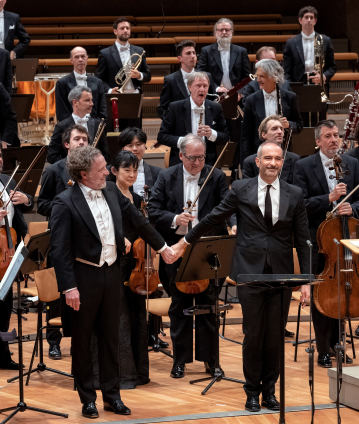Antonello Manacorda and Christian Gerhaher

Antonello Manacorda is at home in the great opera houses. As chief conductor of the Kammerakademie Potsdam, he has also made award-winning recordings, including the complete Schubert symphonies. Rarely has this music sounded “leaner, more logical, more exhilarating”, Der Spiegel wrote. For his debut with the Philharmoniker, Manacorda had programmed Schubert’s “Unfinished”. A further highlight is Mahler’s Rückert-Lieder, with baritone Christian Gerhaher.
Before Antonello Manacorda began his career as a conductor, he worked closely with Claudio Abbado as concertmaster of the Mahler Chamber Orchestra. His debut programme with the Berliner Philharmoniker, which includes the participation of baritone Christian Gerhaher, also shows a pronounced affinity with Abbado’s repertoire: with two native and two immigrant Viennese composers, the selection of works revolves around the specific tone that developed in the Austrian musical capital between the Classical and the Modern eras.
Beethoven’s Coriolan Overture, which begins with powerful orchestral chords and ends fading into pianissimo, paints a thrilling portrait of the inwardly torn Roman hero. Banished from the city of his birth, he allied himself with the enemies of the empire. The programme then turns from political drama to the lyrical inwardness of Mahler’s Rückert cycle, which takes nature, love, transience and detachment from the world as its themes.
Although the works performed in the second half of the concert belong to the symphonic genre, they are each limited to two movements. Arnold Schoenberg began work on his Second Chamber Symphony, which was still written in tonal form, as early as 1906, but did not complete it until 33 years later. In the words of the music theorist Theodor W. Adorno, the composition combines the “spontaneity and originality of Schoenberg’s youth with the supreme mastery of his mature style”.
Schubert’s Seventh Symphony is considered a fragment according to the genre norms of its time, with only two completed movements. Nevertheless, the “Unfinished”, which was not played in public for the first time until decades after its author’s death, reveals Schubert’s entire spectrum of expression between sonority, grief and majesty.
© 2022 Berlin Phil Media GmbH
Related interviews
Artists
Our recommendations
- Iván Fischer and Christian Gerhaher
- Simon Rattle and Christian Gerhaher
- Murray Perahia and Simon Rattle with Schumann’s Piano Concerto
- “Pelléas et Mélisande” with Simon Rattle, Christian Gerhaher and Magdalena Kožená
- Daniel Harding conducts Schumann’s “Scenes from Goethe’s Faust”
- Simon Rattle conducts Schumann’s “Paradise and the Peri”